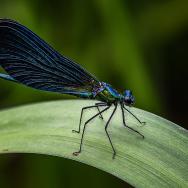A popular TikTok challenge has evolved in which kids resist eating snacks; a new study finds that cuttlefish can do the same.
According to the research, cuttlefish can delay gratification—wait for a better meal rather than be tempted by the one at hand—and those that can wait longest also do better in a learning test. This intriguing report marks the first time a link between self-control and intelligence has been found in an animal other than humans and chimpanzees.
The research, which was published March 3 in Proceedings of the Royal Society B, was conducted at the Marine Biological Laboratory while lead author Alexandra Schnell of the University of Cambridge in the U.K. was in residence there as a Grass Fellow. Founded in 1888 in Woods Hole, MA, the Marine Biological Laboratory is a leading institution in fundamental biological research and is affiliated with the University of Chicago.
“We used an adapted version of the Stanford marshmallow test, where children were given a choice of taking an immediate reward (1 marshmallow) or waiting to earn a delayed but better reward (2 marshmallows),” Schnell said. “Cuttlefish in the present study were all able to wait for the better reward and tolerated delays for up to 50-130 seconds, which is comparable to what we see in large-brained vertebrates such as chimpanzees, crows and parrots.”
Cuttlefish that could wait longer for a meal also showed better cognitive performance in a learning task. In that experiment, cuttlefish were trained to associate a visual cue with a food reward. Then the situation was reversed, so the reward became associated with a different cue. “The cuttlefish that were quickest at learning both of those associations were better at exerting self-control,” Schnell said.
Why cuttlefish have evolved this capacity for self-control is a bit mysterious. Delayed gratification in humans is thought to strengthen social bonds between individuals—such as waiting to eat so a partner can first—which benefits the species as a whole. It may also be a function of tool-building animals, who need to wait to hunt while constructing the tool.
But cuttlefish are not social species, and they don’t build tools. Instead, the authors suggested, delayed gratification may be a by-product of the cuttlefish’s need to camouflage to survive.
“Cuttlefish spend most of their time camouflaging, sitting and waiting, punctuated by brief periods of foraging,” Schnell said. “They break camouflage when they forage, so they are exposed to every predator in the ocean that wants to eat them. We speculate that delayed gratification may have evolved as a byproduct of this, so the cuttlefish can optimize foraging by waiting to choose better quality food.”
Finding this link between self-control and learning performance in a species outside of the primate lineage is an extreme example of convergent evolution, where completely different evolutionary histories have led to the same cognitive feature.
Among Schnell’s collaborators was Marine Biological Laboratory senior scientist Roger Hanlon, a leading expert in cephalopod behavior and joint senior author on the paper.
Other collaborators include joint senior author Nicola Clayton at University of Cambridge and scientists at Ripon College in Wisconsin and the Karl Landsteiner University of Health Science, Krems, Austria.
Citation: "Cuttlefish exert self-control in a delay of gratification task." Alexandra K. Schnell et al. Proc. Royal. Soc. B. DOI: 10.1098/rspb.2020.3161
Funding: Endeavour Research Fellowship via the Australian Government, Grass Foundation, Royal Society, U.S. National Science Foundation, Sholley Foundation, European Research Council.

